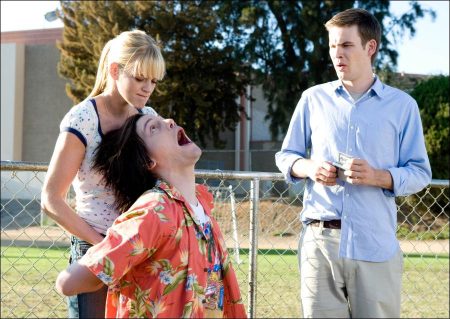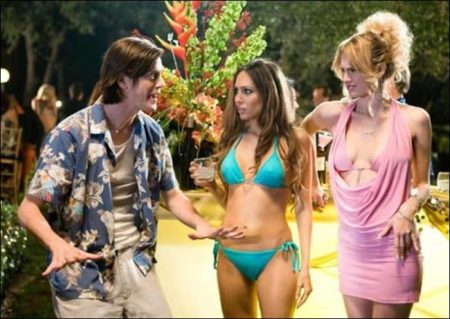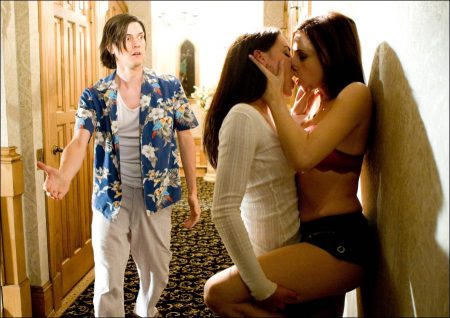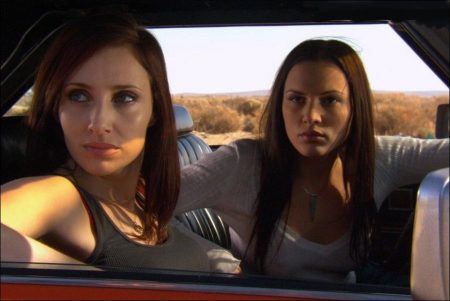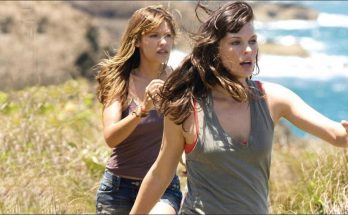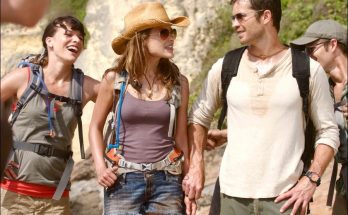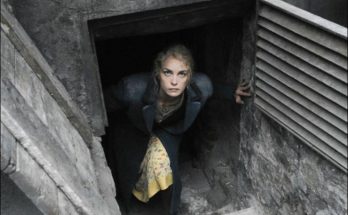Miss March movie storyline. From the moment childhood buddies Eugene Bell and Tucker Cleigh stumble upon a Playboy magazine while rummaging through an older brother’s closet, their paths in life diverge: for Eugene, shamed by the images of the female form, the magazine triggers an anxiety about sex; for Tucker, it stirs a sexual awakening that becomes an obsession.
Fast forward ten years: Eugene (Zach Cregger) is in love with his pious high school girlfriend, Cindi Whitehall (Raquel Alessi), with whom he preaches sexual abstinence to younger students. Meanwhile, the Playboy-crazed Tucker (Trevor Moore) harasses girls and dreams of experiencing the annual bash at Hugh Hefner’s Playboy Mansion.
After three years of abstinence with Eugene, Cindi decides she’s finally ready to consummate their romance. Eugene nervously agrees, and the couple sets prom night as the date when they will finally lose their virginity together. But the plan goes disastrously awry when Tucker gets Eugene so drunk in an effort to psyche him up for the big event that Eugene tumbles down a flight of stairs and blacks out.
After spending the next four years in a coma, Eugene awakens to discover his beloved Cindi has posed nude for Playboy. So begins the friends’ laugh-out-loud cross-country road trip to win back Cindi. Chased by Tucker’s crazed epileptic girlfriend and hordes of homicidal firefighters, will they make it to Los Angeles in time? Can their hip-hop artist friend, Horsedick.MPEG, get them into Hef’s famed abode? And will Cindi, the girl-next-door-turned- MISS MARCH, want anything to do with the lovesick Eugene after so many lost years?
The Making Of Miss March
MISS MARCH marks the feature screenwriting, directing and acting debuts of Zach Cregger and Trevor Moore. The pair, who met in a Brooklyn dorm while studying at New York’s School of Visual Arts, are co-founders of the five-person sketch comedy group “The Whitest Kids U’ Know.” The group performed regularly on campus, then at a Lower East Side rock club after they graduated. Later, they posted their sketches on the Web. But it wasn’t until they got their own show on Fuse TV and, later, the Independent Film Channel (IFC), that Moore and Cregger caught the eye of producer Tom Jacobson.
“I had heard of ‘The Whitest Kids U’ Know’ and seen some of their stuff online,” recalls Jacobson, former co-president of Paramount Pictures. “I thought they were really funny and was looking to get in business with them. Then I found the script for MISS MARCH. We thought it was a really funny script and a funny idea for a movie, so Tobie Haggerty, the Whitest Kids’ manager, my producing partner Monnie Wills and I took it to Zach and Trevor.”
The producers and Fox took a leap of faith in inviting the duo to write, direct and star in MISS MARCH. “Fox came to us with the script and they said they’d be interested in us doing it if we re-wrote it,” recalls Moore. “They liked our TV show and they had this project and they liked the story, and they were like, ‘If you guys can do something cool with this, we’ll get behind you.’”
At first, Cregger was somewhat resistant to the idea. The pair was working on another script at the time and he had other ideas about what kind of film their first feature should be. “I had this notion that whatever we did first should be this big, fantastic—more of like a surreal fairy tale as opposed to a teen road-trip sex comedy,” he says. “I didn’t want to make another PORKY’S.”
But eventually the two warmed to the idea of bringing a completely new take to MISS MARCH. “We took the basic notion of a guy falling into a coma. That’s interesting. He wakes up four years later. That’s interesting. His girlfriend is a Playmate. Okay. So then we added these ideas about abstinence and sexual identity, added firemen, added Candace, added Horsedick, added all that stuff.”
The “they” included Steven J. Wolfe, another producer who helped shepherd the project to completion. “I flipped out when I read it,” recalls Wolfe. “I thought it was one of the funniest things I had read in ages and I just really loved it.”
Jacobson says the quality of the screenplay helped the project get a green light in near record time. “Usually things don’t go this quickly,” he says. “We sold the script. They took about six months to do their draft. We turned it in to the studio. The studio had a few notes on it. They did a quick rewrite and then the studio said, ‘Let’s budget this and let’s make it.’ I told Zach and Trevor, ‘This is not very common so you guys did something really right.’ They wrote a fantastic script and that’s what got it made.”
Part of the script’s appeal is its fresh take on a common male fantasy. “A trip across the country to crash the Playboy Mansion—this is every young guy’s dream basically,” says Wolfe. “There’s nobody you talk to who hasn’t heard of the Playboy Mansion. It brings up something different for everybody. Even if you haven’t been there, you think you’ve been there. The Playboy Mansion is part of our culture.”
Jacobson agrees: “The story has a sort of road-trip urban legend to it. I think a lot of young men fantasize about the notion of what the Playboy Mansion would really be like. What would happen if I could get into a party there? It’s the ultimate fantasy destination for a lot of guys.”
But it is Moore and Cregger’s unique brand of humor, honed through their years as sketch comedy writers and performers, that really sets the script apart. Although Cregger and Moore have earned a reputation for irreverent comedy, Wolfe observes that the duo’s humor resonates with audiences because it is grounded in everyday reality. “All of their sketch comedy is so à propos to everybody’s lives and they really create characters that everyone can identify with,” he says. “One of the things I really love about MISS MARCH is not only is it laugh-out-loud funny, but it has a lot of heart and soul, too. You really like the characters.”
“Comedy is a combination of relatability and originality,” Jacobson adds, “which is something they do really well. Almost everyone who has read this script thinks it’s one of the funniest scripts they’ve read for that reason. There’s a lot of stuff that happens in the movie that you just don’t see coming. You set up a situation and then, ‘Oh my god, I can’t believe that happened.’ The other great thing about it is that it has a really traditional story about a boy getting a girl, losing a girl, and hopefully getting a girl again. You follow it and you care about the two characters a lot because they care about each other.”
Given the near universal positive response to the screenplay, it’s no surprise filmmakers had little problem drawing a strong cast to the production. “It’s a testament to the script that we have this group of hot, talented up-and-coming young actors,” Wolfe says.
In addition to writing and directing the film, Moore and Cregger also took on the roles of the hapless duo Tucker Clay and Eugene Bell—a rare triple duty, but one Wolfe already had experience with. “I think the idea of a duo writing, directing and starring in a film can be scary,” says Wolfe, who worked with multi-hyphenate siblings Michael and Mark Polish on TWIN FALLS IDAHO. “Having done it once before successfully, I kind of knew what it was all about. Zach and Trevor work very much as an extension of each other. It’s like right brain, left brain, you know, and they go back and forth, and somehow very quickly they come to a consensus. It’s four eyes on everything instead of two.”
Cregger says there was never any doubt which role would be his and which would be Moore’s. “From day one when we started writing the script, it was clear I was going to be Eugene and he was going to be Tucker,” he says. “Who else could play that role of Tucker but Trevor? An innocent, lovable yet completely sleazy dude. That’s a Trevor role. And Eugene’s a kind of high-strung stress case, which is how I am in real life a little bit, so we just both put ourselves into these characters.
“I definitely put a lot of me in Eugene,” Cregger continues. “I grew up in a very conservative household in the South and I was part of a very, very rigid youth group, and abstinence was definitely hammered into my consciousness at that age. So I thoroughly understand the rationale that characters like Eugene have.”
For the role of Eugene’s girlfriend, Cindi Whitehall, the conservative schoolgirl who becomes MISS MARCH, the filmmakers chose Raquel Alessi (GHOST RIDER). “For my character, I think they envisioned a typical blonde, blue eyes—just what everyone I guess expects the girl next door to be,” says Alessi. “When I came in there I just felt like I was Cindi. I didn’t think that Cindi had to look or act a certain way. I just think that my personality, my sense of humor, is what really worked. I relate to Zach and Trevor’s sense of humor so much. We just laughed during production all the time.”
It was partly that intense belief on Alessi’s part that helped her land the role. Cregger recalls the actress as being “dynamite” on her first audition. “She came in and did such a good job that everyone there, all the Fox execs and everybody was like, ‘Okay, that’s it,’” Cregger says.
The role of Tucker’s girlfriend, Candace, went to Molly Stanton (“Twins,” “Passions”), who initially auditioned for the part of Cindi. “She did a great job, but I just didn’t see her as a Cindi,” says Cregger. “But Trevor was the one who was like, ‘That’s Candace.’ He just knew. And I was like, ‘Really?’ So we brought her back in to read for Candace and it was just, ‘Oh yeah, that’s Candace.’”
For her part, Stanton relished the range and extreme nature of the Candace role. “She’s so tough,” says the actress. “She’s got karate moves and strip pole moves. I love it. I get to be every possible thing which is so much fun, from sweet to crazy back to sexy to sweet and again crazy, crazy, crazy.”
The larger-than-life character Horsedick.MPEG is a high school friend of Eugene and Tucker’s who becomes a huge rap star with hits that consist of endlessly repeated explicit one-line lyrics. For that role, the filmmakers turned to Craig Robinson, best known for his role as warehouse manager Darryl Philbin in “The Office.”
Jacobson says he was blown away by what the actor brought to the part. “When we sent the script out to Craig for this part, he instantly got it,” says the producer. “We didn’t have to do much convincing. He came in and just killed it and it was like, wow! And every time he’s on screen it’s just gold.”
Moore says Horsedick is one of his and Cregger’s favorite characters in the film. “He’s the center of the party even if he’s by himself. He’s always very loud and yelling and is just a fun-to-be-around guy who’s at the same time completely despicable. When we were doing the auditions for it, Craig came in and right off the bat, without any direction from us, just was the character—he did it perfectly. So as soon as he left, we were like, ‘Well, that’s Horsedick.’”
Robertson says he relished the opportunity to play the character. “I’m glad to get a chance to play this guy ’cause he’s so over-the-top and crazy. It’s completely and utterly ridiculous. That’s the fun in it. You’re given these serious moments and then you start to laugh at them because of what he’s saying.”
Rounding out the cast are Cedric Yarbrough of “Reno 911!,” Carla Jimenez (NACHO LIBRE) as Eugene’s nurse, real-life 2007 Playmate of the Year Sara Jean Underwood as a Playboy model, and, in a pivotal scene with Tucker at the Playboy Mansion, the legendary Hugh Hefner.
In her scene, Underwood’s character—the delectable Miss February—gets chatted up by Moore’s Tucker. But what starts out as a promising conversation quickly goes south as Tucker’s antics completely destroy any chance he might have had of forging a connection with the beautiful model. It’s a scenario Underwood says has played out in her life numerous times. “I get people coming up to me and they’re like, ‘Oh, my gosh, I loved you in the magazine.’ And then a lot of times they’ll just start saying the most ridiculous things. And maybe I wouldn’t be as mean as I’m going to be in this movie, but I definitely get irritated with shall we say, ignorant comments.”
For his part, Hefner says he gladly agreed to do the cameo and to allow the Playboy Mansion to be used in the film because he is a fan of Moore and Cregger’s work. He also saw the script as complimentary to Playboy. “There’s something in the lifestyle related to my life and particularly to the Playboy Mansion that, in a remarkable way, continues to be popular with each new generation,” says the iconic 82-year-old founder of Playboy Enterprises. “I think it’s probably because there’s a little bit of Playboy in all of us, both men and women. Whole new generations have indeed tried to find their way into the Playboy Mansion, and I think that is a high compliment.”
In his cameo, Hefner gets to share some words of wisdom with Moore’s character, who manages to make his way into the mansion’s inner sanctum. “Rather than kicking him out, I let him sit down and I try to give him a sense of my own perceptions of the Playboy philosophy and set him straight,” he says. Hefner has appeared in several films and television shows and says getting in front of the camera comes pretty naturally these days. “The only character that I have portrayed is Hugh Hefner and I have been doing that for a number of years, so it gets easier.”
Not surprisingly, for Moore and Cregger, doing triple duty as a first-time feature writer-director- actor team was not without its challenges. “It is a huge job,” Cregger says. “I’ve never been given this much responsibility or money to do anything before. It’s been overwhelming at times and at times the most awesome experience.” Given Moore and Cregger’s novice status as filmmakers, it was important to surround them with a crew of seasoned production pros. So the producers brought in renowned cinematographer Anthony B. Richmond, as well as a highly regarded editor, lighting and sound crew and others, including make-up artist Dominie Till, who oversaw such successes as THE LORD OF THE RINGS franchise and KING KONG.
Having collaborated closely since their college days, Moore and Cregger quickly fell into a smooth working relationship on MISS MARCH. “We had a pretty concrete unified vision before we started preproduction so it was pretty fluid and seamless as far as that,” Cregger says. “I feel comfortable being in front of the camera and having him direct me, and I think vice versa. When I’m getting stuff glued to my face, he can be lining up a shot, and when I show up to check out the shot I’m nine times out of 10 like, ‘There it is. That’s the shot. Good.’ So it’s pretty cool that way.
“The tricky part,” Cregger continues, “comes when you’re getting ready to act in a difficult scene and you’re trying to enter that headspace, and somebody’s coming up, asks, ‘Do you like this cup or do you like this cup?’ I’m like, ‘I don’t know which cup I like. Trevor, help!’”
The hardest day of shooting was actually the first, says Cregger, when they shot the scene in which Eugene and Cindi give their abstinence speech to an auditorium filled with 70 kids. Cregger learned the hard way the wisdom in the old filmmaker adage to avoid working with kids and animals. “I had quit smoking and I was instantly smoking again. It was like no one was listening to me and I had this flash that, okay, this is going to be the worst experience of my life.
I’m not cut out to be a director. That was the most difficult scene in the entire movie. I’m glad it was the first one we shot because everything after that seemed easier by comparison.” Moore says he was struck by the sheer scale of the moviemaking experience compared to working on their TV show.
The amount of physical comedy in the movie, much of which is at Eugene’s expense, turned out to be a bigger challenge than Cregger anticipated. “Eugene takes a few lickings in the movie,” Cregger says. “He gets thrown down the stairs, he gets hit in the face with a baseball bat, he gets beat up by rappers, he gets beat up by bouncers, he gets thrown out of a bus. It’s funny, when we were writing it, I never once stopped to think of the ramifications of this, which are that I spend two hours a day having stuff glued to my face before I come to work. So I think when I do another one of these, I’m going to be a bit more thoughtful in that regard.”
Cregger, who did have a stunt double on the shoot, was surprised at how challenging some of the stunts he did himself turned out to be. “There’s a scene when Tucker is wheeling Eugene down the steps in a wheelchair and then he lets him go down a hill, and Eugene slams into this car,” Cregger recalls. “I was going really fast and I hit this car and no one told me how to stop myself; it was a really hard hit. So while I don’t do all my own stunts, I take a few hits for real.”
Molly Stanton, who plays Candace, says she was impressed by Moore and Cregger’s performance both behind the camera and in front of it. “What I love about Trevor and Zach is the style that they’ve chosen for this movie,” says the actress. “It’s like Trevor’s got this whole thing, his eyes get really huge as soon as the camera goes on, like a little crazy also, psycho eyes, just the widest eyes you’ve ever seen. Then Zach is just so sarcastic. You believe them both and they’re lovable characters. They have so much chemistry together. I love watching them.”
Craig Robinson says he was impressed by the relaxed atmosphere the two neophyte directors created on the set. “They’ve been very loose and it’s a very collaborative effort. I thought of ideas and they’d be like, ‘Yeah, let’s try it.’ It’s just a lot of imagination at work. We just go for it. It hasn’t felt like the normal director-to-actor relationship. It’s been more like buddies going, ‘Hey, let’s do this!’ It’s a lot of fun.”
Playboy Playmate Sara Jean Underwood, who has no previous acting experience, says she was initially intimidated at the prospect of working with Moore and Cregger. “I felt like I had a lot more to live up to and had to have much more talent to act than to smile in front of a camera,” she says. “But they were really nice and they gave me good advice when I read over the lines. They were like, ‘Okay. Loved this. But see if you can do it like this.’ And then we would try it again. They just did a really good job guiding me and making me feel comfortable.”
Although they welcomed the actors’ input, the filmmakers did not encourage improvisation on the set. “That’s not how we do the TV show either,” says Cregger. “A lot of people have a misconception about that. Just because we come from sketch doesn’t mean we’re not pretty meticulous. For the TV show, we write our sketches out and then we learn them verbatim. We’re incredibly nitpicky with inflection and tone and pauses and all that. Hopefully with other actors, we let them bring what they have to the table, but other than with Craig Robinson, we don’t really ever encourage improvisation.”
“Going from the sketch comedy world to a feature length film, with its narrative arc and character development; that is a bigger task and a bigger challenge,” explains Cregger. “You can get away with things in sketch comedy where you don’t have to really explain anything. If the joke is solid, then you’ve done your job and the sketch is good. But when making a movie you’ve got to bow to a lot of different forces and principles as far as telling a story. This whole experience has been a blast and a lot of fun but also a great learning experience for us.”
Miss March (2009)
Directed by: Zach Cregger, Trevor Moore
Starring: Zach Cregger, Trevor Moore, Raquel Alessi, Molly Stanton, Holly Hindman, Craig Robinson, Tanjareen Martin, Carla Jimenez, Remy Thorne, Geoff Meed, Alexis Raben, Eve Mauro, Lindsay Schoneweis
Screenplay by: Zach Cregger
Production Design by: Cabot McMullen
Cinematography by: Anthony B. Richmond
Film Editing by: Tim Mirkovich
Costume Design by: Sarah de Sa Rego, Alexis Scott
Set Decoration by: Beth Wooke
Art Direction by: Dins Danielsen
Music by: Jeff Cardoni
MPAA Rating: R for strong crude and sexual content, nudity, pervasive language, drug use.
Distributed by: 20th Century Fox
Release Date: March 13, 2009
Views: 211
